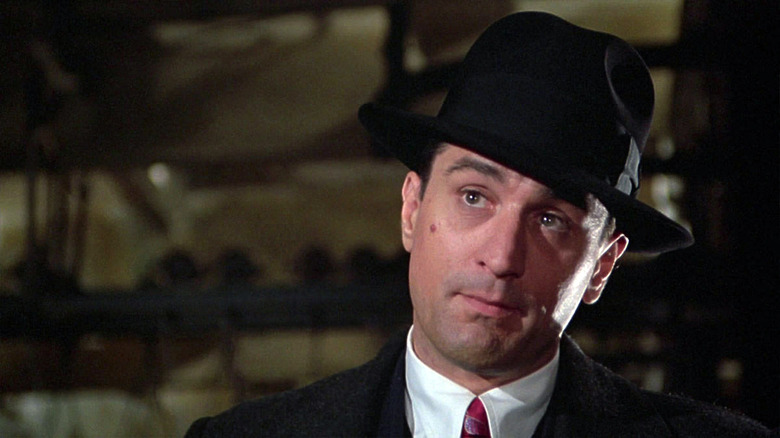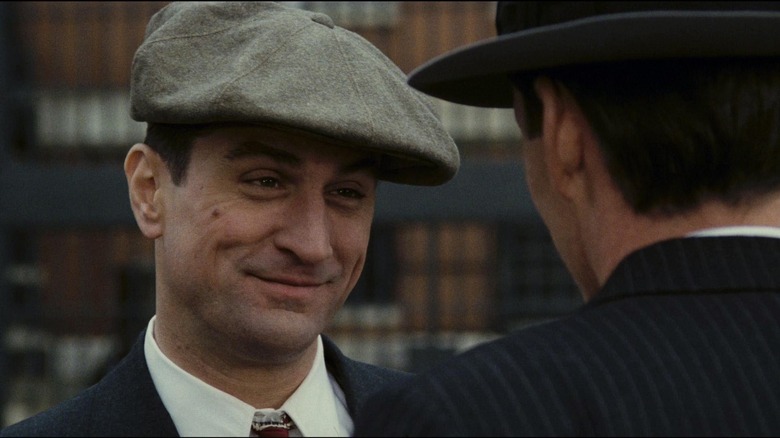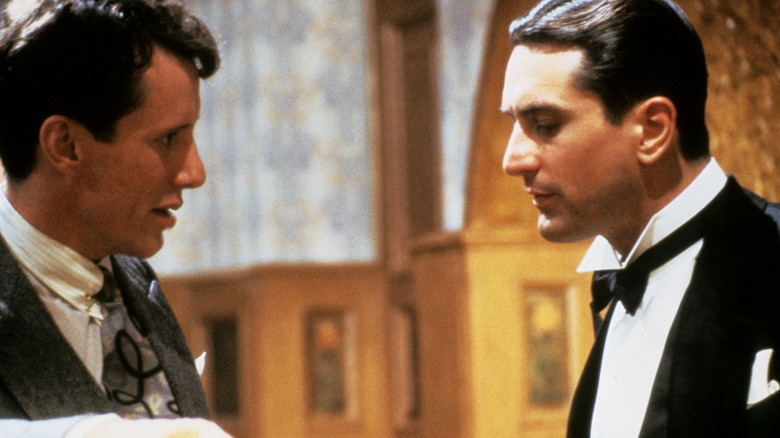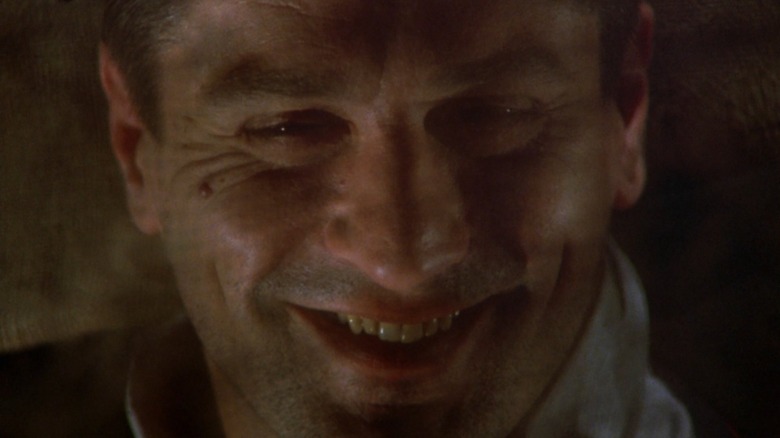A Sergio Leone Toilet Dispute Nearly Caused Robert De Niro To Drop Out Of Once Upon A Time In America
Director Sergio Leone's impact on cinema is still felt thanks to his "Dollars Trilogy" of Westerns: "A Fistful of Dollars," "For A Few Dollars More," and "The Good, the Bad, and the Ugly," three films that revolutionized the Western genre and introduced Clint Eastwood as a star to be reckoned with.
But with the enormous success of those films, Leone found himself pigeonholed, only able to find quick financing for further Western adventures and not other types of movies he hoped to make. Leone was less interested in making endless shoot-em-ups than he was in making films that observed America from an outsider's perspective, which is partially why the gap between 1971's "Duck, You Sucker" and 1984's "Once Upon a Time in America" was so huge. Leone even turned down the chance to direct "The Godfather" in order to pursue his own vision of early 20th century crime, its relationship to politics, and the overall myth of the United States.
Putting together a script and a cast for his dream project "Once Upon a Time in America" over a decade and change, Leone convinced none other than the greatest male actor of the late '70s and early '80s, Robert De Niro, to star in the film. Yet their rich and impressive collaboration almost didn't happen at all thanks to their relationship turning into a near-literal — ahem — pissing contest.
Leone puts together his epic for an epically long time
According to Shawn Levy's 2014 biography of De Niro entitled "De Niro: A Life," Leone became enraptured by the material that would become "Once Upon a Time in America" to the point of near-possession. Reading a book by real-life gangster Harry Gray entitled "The Hoods" sometime in the mid-'60s, Leone found the story haunting him "like the malediction of the Mummy in the old movie with Boris Karloff. I wanted to make that film and no other."
For a while, it seemed Leone was only going to produce a film version of "The Hoods," even as he took the story around to several screenwriters, including Norman Mailer, and directors like Milos Forman and Peter Bogdanovich. Having spoken to De Niro once before about the project, Leone returned to the actor once he'd finally secured the rights to the book, written a draft himself, and decided to direct the movie. As the actor recalled, "He told [me] the story almost shot by shot, with the flashbacks, and it was beautiful. I said, 'This is something that I'd like to be part of.'"
Leone and De Niro were initially so eager to work on this film together that the director even offered the actor his choice of role, with De Niro choosing between the movie's complex antagonist, Max, and the deeply flawed and conflicted central character of Noodles. While Leone prepared the sets and locations for what promised to be a multi-year shoot, De Niro contemplated which role to take, a decision that was complicated by, of all things, a dirty toilet seat.
De Niro and Leone nearly piss away their chances of working together
Still not quite committed to the film, De Niro agreed to meet Leone at the Mayflower Hotel in New York City. Producer Arnon Milchan booked a suite for the meeting to allow everyone their own personal space. Already put off by Leone's less-than-professional outfit of only a bathrobe and underwear, De Niro was incensed to discover that, in his bathroom, Leone had left something behind. As Levy described the scene:
"The producer found De Niro agitated.
'I can't do the movie!'
'Why not?'
De Niro led him into the en suite bathroom of his bedroom and pointed to the commode. 'Can't you see that he pissed all over my toilet seat?'
There was, in fact, urine on the toilet seat. A flummoxed Milchan improvised an answer: 'Come on, Robert. He didn't do that on purpose. He's fat; he didn't see.'
But De Niro insisted it was a power play, a marking of territory, a crude show of superiority, and he actually seemed ready to drop out of the film because of it."
Leone had certainly pissed actors off before, but this was the first known instance of it happening so literally!
The De Niro and Leone toilet seat incident becomes another drop in the bowl (er, bucket)
Fortunately, De Niro had not become so pissed by piss, allowing cooler heads to prevail. Ironically, it wasn't out of Leone's desire or need to have De Niro star in the film that finally convinced him to do it, but quite the opposite. As the actor explained, "They were gonna do it, with or without me [...] He didn't raise the money on me, so there was no pressure that way."
With James Woods taking the role of Max, De Niro chose to play Noodles, a "hero" who commits a number of immoral and unforgivable acts during the film yet is perversely the movie's most sympathetic character. It's one of the actor's most complex characters, in a film that is so nuanced in its storytelling that, even upon its release in 1984 (in a bizarrely maligned form which Siskel & Ebert took to task), it seemed part of a dying breed of cinema. Even though "Once Upon a Time in America" is a masterpiece that still feels like it hasn't gotten its full due, it now exists in its complete form for people to discover and re-discover. Despite being a whiz of a filmmaker, Leone's poor hygienic habits almost meant that we may not have even gotten that lucky, and I, for one, would've been really, uh, pissed if that had been the case.



